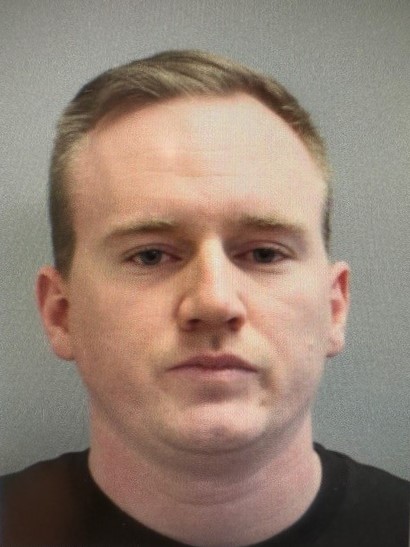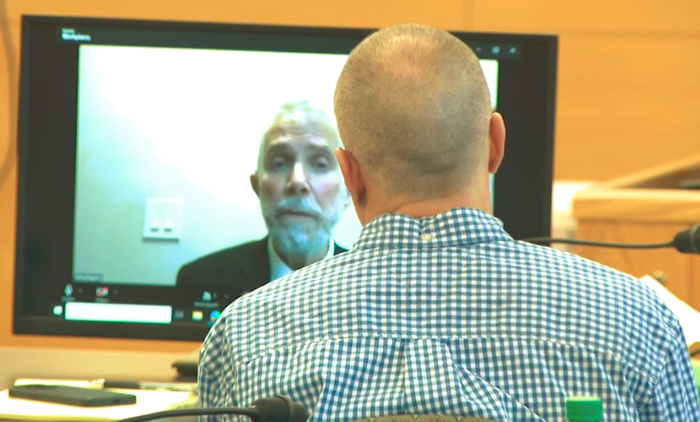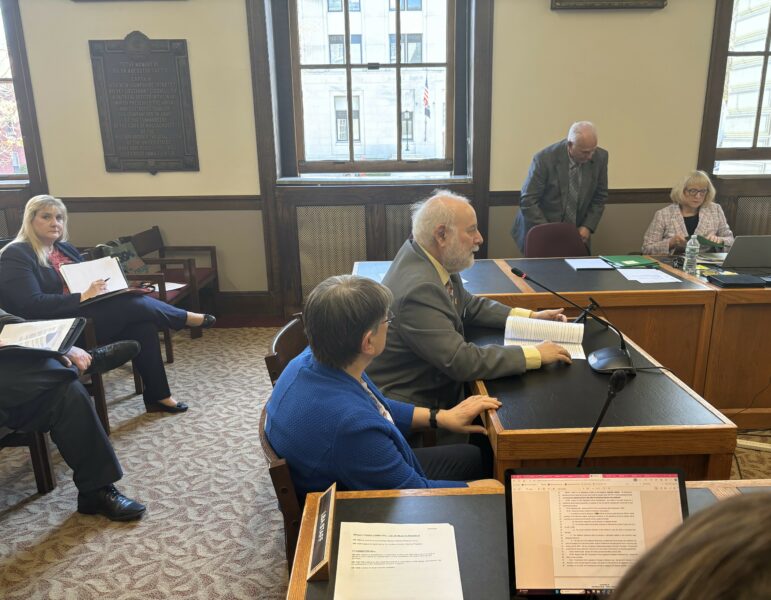Highlights Sununu’s Prohibitionist Policy as Backwards for NH Compared to Neighbors
MANCHESTER — Executive Councilor and candidate for governor Andru Volinsky held a press conference in Manchester at a New Hampshire Liquor and Wine Outlet to press his marijuana legalization plan.
Special guests Marcus Ponce De Leon, candidate for state representative, and local social justice advocate Erika Perez also spoke at the event in support of Volinsky’s plan. The plan, which you can read here, includes legalizing possession of up to one ounce of marijuana for adults 21 and over, allowing for adult homegrown cannabis, providing new revenue for public schools and community colleges, and funding drug and alcohol and mental health treatment.
Ponce de Leon explained the personal impact of having a prohibition policy in New Hampshire. “Families across my district and the Granite State have had their opportunities for economic prosperity limited by the unjust policies imposed on our state, and while steps were taken to decriminalize cannabis in New Hampshire, nothing has been done to address the existing convictions that overwhelmingly targeted black and brown communities; convictions that even to this day hold many members of my district back from being able to pass a background check for higher paying jobs,” Ponce De Leon said. “It’s crucial that we bring an end to this, and work to get previous convictions expunged, and that’s one of the many reasons why I’m voting for Andru, and why we all need to be sure to vote Andru Volinsky in the primary next Tuesday, then get rid of Sununu in November by Voting for Andy on November 3rd.”
Erika Perez noted how much further New Hampshire needs to go to decriminalize marijuana. “Many people think marijuana was decriminalized in New Hampshire. That’s not necessarily true,” she said. “Possession of more than 3 quarters of an ounce is considered a misdemeanor, which could be equal to a year in jail or a fine of $350. Decriminalization is a start, but we need to do better. There are multiple studies that have found that Black and White people use drugs at a similar rate, and despite that, Black people are 4 times more likely to be arrested for cannabis possession here in New Hampshire, even though we only make up about 1% of the population here.”
Along with being an issue of racial justice, marijuana legalization would also provide revenue for public schools and community colleges. The event was held outside of a New Hampshire State Liquor and Wine Outlet in Manchester. As governor, Volinsky would lease spaces in these outlets to certified marijuana retailers and use the revenue from these leases to provide funding for public education.
“Governor Sununu has been the greatest barrier to legalizing marijuana, and to solving the racial injustice issue that it presents,” Volinsky said.
“Here’s what I would do. I would legalize cannabis for those 21 and over up to an ounce. I would make it clear that growing up to six plants is legal in our state. That’s if people need cannabis for healthcare reasons, including many of our vets, who suffer with PTSD.
I would make it legal for them to possess marjuana in New Hampshire. I would tax the sale of Marijuana in New Hampshire. New Hampshire, among all its neighbors, is the only state that has not legalized adult use of cannabis. I would offer a plan subject to discussion with the legislature to rent space in our State Liquor Stores to retailers who would be chosen with social equity issues in mind, favoring women-led, veteran-led, BIPOC-led business who have the capability of coming together complying with regulatory protocols and safely selling marijuana to adults in New Hampshire.”
Volinsky noted his commitment to making sure marijuana legalization has strong social equity components that learn from the failure of Massachusetts to include communities of color. “The legalization of marijuana is a racial justice issue as well as a revenue issue. Black and Brown young people are often disadvantaged at a much higher rate. That’s number one. Number two, New Hampshire has a revenue problem. From the studies we’ve read, we can expect $20-30 million dollars in direct tax revenue, and we can expect additional revenues through licensing wholesalers and retailers. If we’re smart about where the wholesalers locate, they can improve the property tax base in property-poor communities, which we know plays a big role in the school funding problem,” he said.
Volinsky has been endorsed by Rights and Democracy-NH, 350-NH, New Hampshire Youth Movement, and many other grassroots organizations and unions for his dedication to courageous and equitable leadership for all Granite Staters. To watch the full press conference, visit Volinsky for New Hampshire on Facebook.





